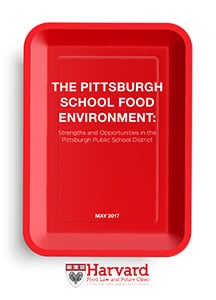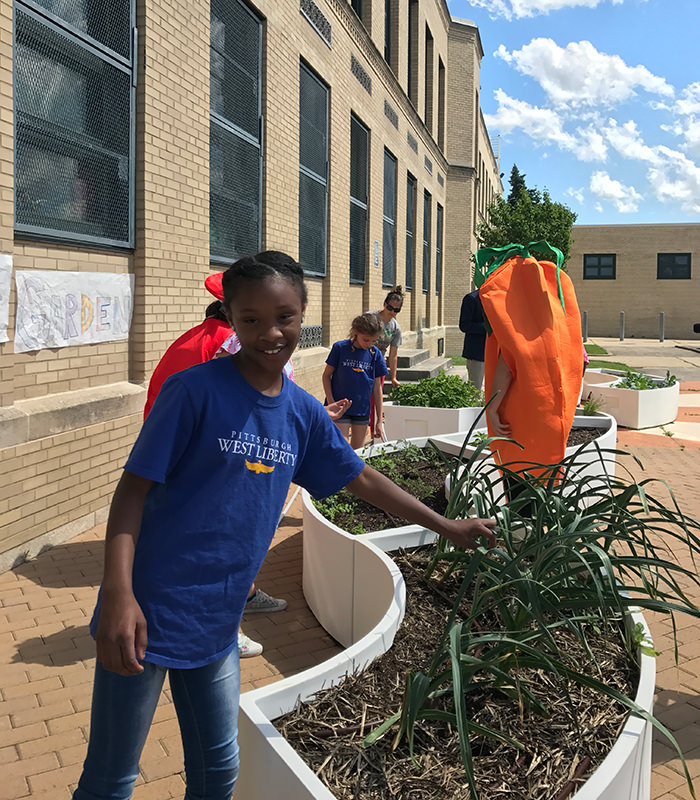On May 31st, a bunch of kids led a tour of the garden that they had helped to grow right there at West Liberty Elementary School. A giant carrot, a giant apple, and a small crowd of organizational representatives from all over the City followed them closely.
The kids told the costumed staff and the crowd about how much fun they’d had growing their garden. But the students also taught them about how important freshness is to taste and nutrition.
The kids were helping to introduce “Celebrating Success and Advancing the Future of School Food,” a presentation by the Pittsburgh Food Policy Council (PFPC) on the results of its year-long partnership with the Harvard Food Law and Policy Clinic and Pittsburgh Public Schools (PPS). The partnership’s goal? To better understand the challenges faced by our city’s schools, to find the best food policies and practices in Pittsburgh and comparable cities, and to highlight recommendations for future work.
Over the past year, Just Harvest staff members helped to lead this effort as part of the PFPC’s Food & Health Equity Working Group. After the Harvard Clinic issued a detailed report and set of recommendations in August of 2016, that working group then gathered feedback and more ideas for improvement from PPS Food Service Director Curtistine Walker, the Excellence for All Committee of PPS parents and teachers, and from the PFPC’s own diverse membership.
 Based on those comments and the Harvard Clinic’s final report, the working group then developed five main priorities to help focus PFPC future efforts to improve child nutrition in schools.
Based on those comments and the Harvard Clinic’s final report, the working group then developed five main priorities to help focus PFPC future efforts to improve child nutrition in schools.
The report recommends that PPS promote:
- alternate breakfast models to increase the chance that kids to eat in the morning, which extensive research has shown to greatly improve concentration, behavior, and learning outcomes;
- farm to school procurement for the freshest produce possible, not only for the sake of better flavor, but also for its much higher nutrient content;
- out-of-school food programs that give students access to nutritious food outside of the typical school day, which is especially important in communities that don’t have grocery stores or good public transit systems;
- from-scratch cooking which allows staff to better control ingredients to tailor meals to school and student tastes and needs, and also generally tastes fresher, can lead to far less food waste, and can help school districts control costs and distribute food more equitably across the system; and
- increased school meal time, because, as one parent exclaimed at the Excellence for All parent-teacher meeting, “what does it matter if the food put in front of my kid is cooked from scratch from fresh produce right from a local farm if he doesn’t have time to take more than a few bites!”
PPS Superintendent Anthony Hamlet and Food Service Director Curtistine Walker both attended the event and warmly received both the PFPC recommendations. Greater Pittsburgh Community Food Bank also presented them with the Crystal Apple Award in recognition of the improvements PPS has already made through their innovative approaches to addressing student hunger.
Both Hamlet and Walker expressed their enthusiastic willingness to keep partnering with the Pittsburgh Food Policy Council (and the kids from their own schools!) Just Harvest couldn’t be more excited about this.
Together, we’ll nourish the good ideas that this community planted and help them grow to fruition.





No comments yet.